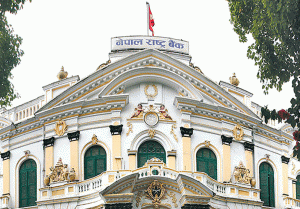
Op-ed editors of broadsheet dailies published in Kathmandu on Thursday have given space to a wide range of issues including Nepal’s ties with China and, the growing trade deficit and challenges in delegating power to the local government bodies.
Nepal’s growing dependence on imports

In his lead article for Kantipur, former finance minister Prakash Chandra Lohani raises an alarm over the growing import volume and Nepal’s trade deficit with India. He says that Nepal’s rulers have adopted a policy of not creating jobs in the country and exporting the youth to work abroad. They then use the remittances the workers send to finance the imports. This has one more benefit as people who would take to the streets to protest are no longer in the country. Similarly, there are only children and elderly left in the villages and agricultural production has taken a hit. He says ‘crony capitalism’ has taken roots in Nepal and it will not help alleviate Nepalis out of poverty.
Nepal’s ties with China

Biswas Baral in his lead article for Republica, says that Indian Prime Minister Narendra Modi’s foreign policy is primarily driven by domestic and personal calculations, more so than any other Prime Minister of independent India. He says that after blockade on Nepal, Modi saw that Nepal was tilting towards China, and he did not want that to happen.
China continues to make its presence felt in Nepal, and with more Chinese money and people coming into Nepal, the Chinese presence has become more visible than ever in Nepal. The Chinese President is expected to visit Nepal in 2018, after he consolidates his position as the strongest leader after Mao.
Baral, however, warns that Nepal should not forget the hegemonic relations China has with neighbours Vietnam and Cambodia. Nepal should not allow China to do whatever it wants just to ‘show’ the Indians. There needs to be a vision for how China and Nepal are to move forward in furthering ties.
Is India correcting its course on Nepal?

During Prime Minister Sher Bahadur Deuba’s visit to New Delhi, Nepali analysts were all ears to Modi as they deciphered word-for-word to check whether India had corrected its course on Nepal after the 2015 blockade. In this context, Homnath Dahal, in his lead article for Annapurna Post, says if India has understood that it hurt Nepali sentiments by enforcing the blockade, the the visit could be deemed successful. He says that Deuba represented the voice of the Nepali people when he maintained the line that Nepal remains neutral on the standoff. However, India did not heed to Nepal’s calls to waive Rs 1.48 billion Kathmandu owes to New Delhi for an arms purchase deal.
Delegation of authority to local governments

Advocate Dipendra Jha and Madhesh analyst Chandra Kishore, in the articles for Kantipur, talk about the heavy centralisation of power in the country. In his piece, Jha says the state should not entrust the whole responsibility of implementing the constitution and federalism on the bureaucracy. He says that although political parties talk about decentralisation, the bureaucracy wants to return all powers to Singha Durbar.
Chandra Kishore says that Madheshis should take the elections as a a stepping stone towards realising their aspirations. They should look at themselves in the context of the Nepali society and the Kathmandu should also look at Madhesh in a similar way.
























